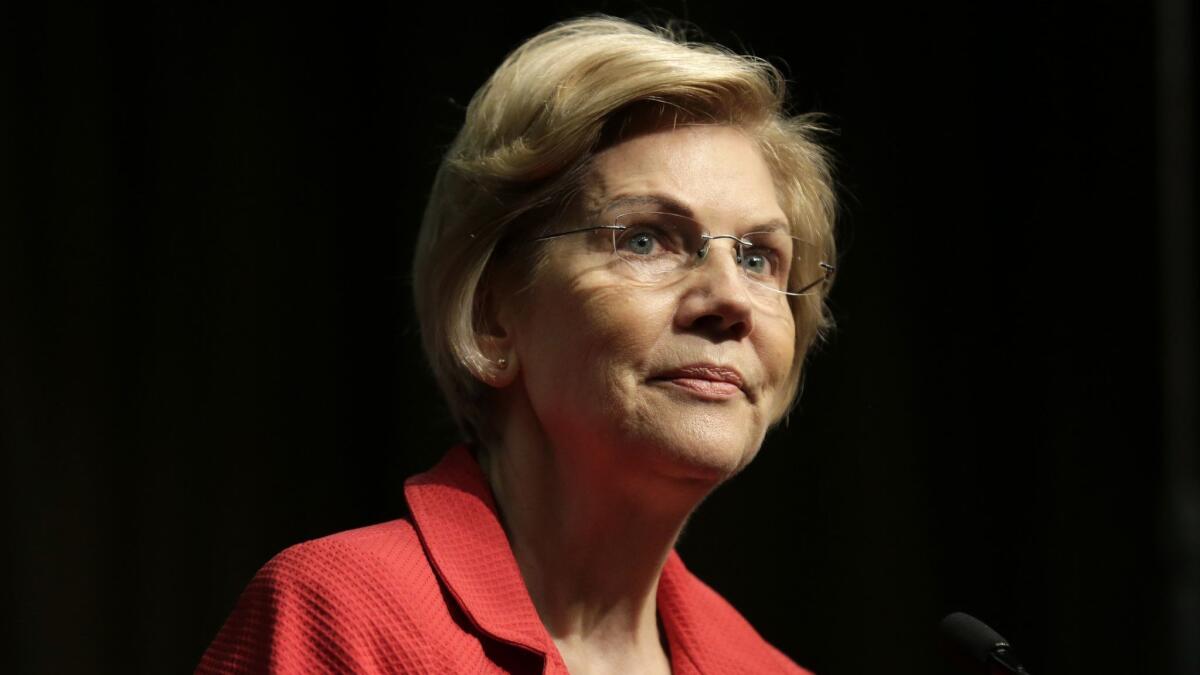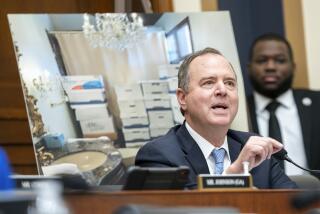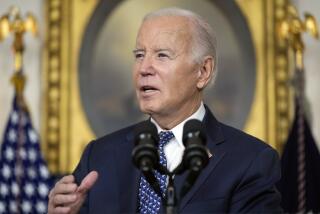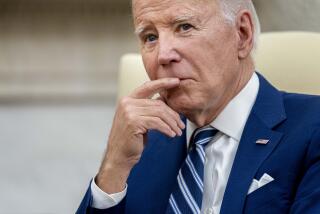Analysis:: Mueller report poses an unexpected problem for Democrats

The release of the special counsel report on Russian interference in the 2016 election marks the end of political shadow-boxing over a secret investigation of President Trump and the beginning of open warfare over whether he should be reelected in 2020.
The long-awaited report from Robert S. Mueller III will almost certainly inflame partisan passions on both sides, even if it changes few voters’ minds about Trump. And it will pose new challenges to Democratic presidential candidates, who have mostly steered clear of the Russia investigation to develop distinctive brands that stand for more than opposing the president.
The problem for Democrats is that the report, while damning and shocking in parts, was not a death blow for Trump — and that mixed message threatens to split the party.
Sen. Elizabeth Warren of Massachusetts on Friday became the first major presidential candidate to demand impeachment hearings.
“The severity of [Trump’s] misconduct demands that elected officials in both parties set aside political considerations and do their constitutional duty,” Warren said on Twitter. “That means the House should initiate impeachment proceedings against the President of the United States.”
Other Democratic presidential candidates have been more cautious, and party leaders in Congress have shown no appetite for impeachment.
Congressional leaders are reluctant to begin a fraught, highly partisan process in the House that will almost certainly die in the Republican-controlled Senate.
That means that, unless the momentum for impeachment shifts dramatically, Trump’s fate most likely will be decided by voters in the 2020 election, not on Capitol Hill. And that is just fine with most of the huge crop of Democratic presidential candidates.
The challenge for them continues to be how to construct a campaign message that can attract the swing voters needed in the general election while still stoking the enthusiasm of Democratic activists who crave Trump-bashing.
“For the core of the Democratic base, [the Mueller investigation] is insatiable red meat. For nonpartisan voters, it’s not clear how much they care anymore,” said Chris Kofinis, a Democratic political strategist neutral in the 2020 primary season. “The reality is that being anti-Trump, no matter how justified, is not a winning strategy, because if it was, Hillary Clinton would have been elected.“
The political crosscurrents buffeting Democratic candidates in the post-Mueller landscape were in evidence as they campaigned after the report’s release. Candidates put out statements and fielded questions from reporters, but few voters asked about it.
“It’s certainly not at the top of mind of most voters around the country,” Sen. Kirsten Gillibrand of New York said to the Des Moines Register while campaigning in Iowa. “They’re concerned about their families, and that’s why I’ve put together a huge platform on really robust ideas and bold visions on how we’re going to get stuff done.”
Even Sen. Bernie Sanders of Vermont, who has been one of the most outspoken critics of Trump on the campaign trail, stopped short of calling for impeachment in the written statement he issued. And he said nothing about the investigation in his late-day campaign appearance in Spartanburg, S.C., where he focused on education and criminal justice reform.
Despite heavy coverage on cable TV and Twitter about embarrassing details in the redacted report, what once promised to be a potent weapon for Democrats turned out to be a mixed bag.
The report made clear that Trump and his campaign welcomed Russian efforts to sway the election on his behalf even though it involved a hostile intelligence service operating on U.S. soil. But Mueller did not find conclusive evidence of a criminal conspiracy.
Mueller also documented multiple occasions when the president tried to undermine or kill the investigation, but he made no judgment on whether Trump committed the crime of obstructing justice.
Instead, the report painted a vivid portrait of a man who saw his presidency at risk and who went to great lengths to protect himself against what he saw as implacably hostile investigators.
Some Democrats rushed to exploit political opportunities the report created. At least two candidates — Warren and Sen. Kamala Harris of California — swiftly deployed the news to raise money and build their fundraising lists.
Although no candidate flatly ruled out impeachment, Warren was the only major candidate to demand it.
“To ignore a President’s repeated efforts to obstruct an investigation into his own disloyal behavior would inflict great and lasting damage on this country,” said Warren, whose campaign has lagged behind many 2020 competitors in fundraising and polling.
A Warren aide said her statement did not signal a shift from her campaign’s central focus on economic issues. But, the aide said, the candidate felt the need to speak out after reading the full Mueller report Thursday while on an all-day flight to Boston from a campaign swing through Colorado and Utah.
Others have been hedging, noting that only reporters were asking about the report. Former Texas Rep. Beto O’Rourke, who may have held more town halls in Iowa than any candidate so far, says he has answered about 500 questions. “The Bob Mueller investigation has come up two or three times,” he said Thursday.
O’Rourke said he would leave it to congressional leaders to take the lead on hearings and impeachment.
Pete Buttigieg, mayor of South Bend, Ind., suggested on NBC’s “Late Night with Seth Meyers” that Mueller’s findings won’t change much for Trump politically, projecting agnosticism about impeachment.
The report, he said, is “one more reminder that if we really want to send Trumpism into the history books, the best thing we can do is defeat it decisively at the ballot box in 2020.”
Yet for now, one product of the report has been intraparty tension between Democratic activists and party leaders such as Speaker Nancy Pelosi of California and House Majority Leader Steny H. Hoyer of Maryland. They see no point in starting House impeachment proceedings that would die in the Senate and possibly give Trump a leg up for 2020.
“This is unbelievably disappointing,” Jon Favreau, a former speechwriter for President Obama, tweeted upon learning that Hoyer had declared impeachment proceedings not worth it. “Even if you don’t ultimately pursue impeachment proceedings, why on Earth would you say this today?”
Some Democrats are torn between the two sides of the argument.
“Letting Trump slide makes me sick,” said Danny Barefoot, a Democratic media strategist who is not allied with any 2020 candidate. “But there aren’t [enough] votes in the Senate to convict the president. Americans get tired of drama quickly. My head says we end this at the ballot box.”
It’s doubtful that many voters will change their views of Trump because of the Mueller report. His core supporters have stuck with him through thick and thin, and polls show his approval rating has gone up and down within a very narrow range even as his administration has been rocked with controversy.
Still, with election day 19 months away, there is plenty of time for damning new information about Trump to sink in — or sink like a stone.
Until now, the flow of information has “largely been controlled by Mueller and Trump’s Justice Department,” said Mark Longabaugh, a Democratic strategist who used to work with Sanders. “Now, the report is out and Congress will fight the redactions and start calling witnesses. Let’s see what the public thinks in a few months.”
Times staff writer Evan Halper contributed to this report.
More to Read
Get the L.A. Times Politics newsletter
Deeply reported insights into legislation, politics and policy from Sacramento, Washington and beyond. In your inbox three times per week.
You may occasionally receive promotional content from the Los Angeles Times.







